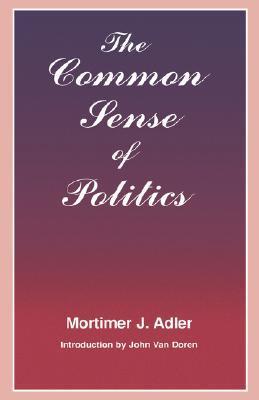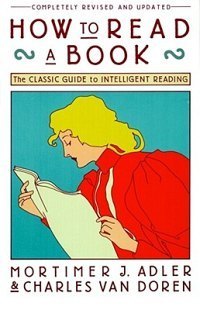
Numerous published works of American educator and philosopher Mortimer Jerome Adler include How to Read a Book (1940) and The Conditions of Philosophy (1965). This popular author worked with thought of Aristotle and Saint Thomas Aquinas. He lived for the longest stretches in cities of New York, Chicago, San Francisco, and San Mateo. He worked for Columbia University, the University of Chicago, Encyclopædia Britannica, and own institute for philosophical research. Born to Jewish immigrants, he dropped out school at 14 years of age in 1917 to a copy boy for the New York Sun with the ultimate aspiration to a journalist. Adler quickly returned to school to take writing classes at night and discovered the works of Aristotle, Thomas Aquinas, John Locke, John Stuart Mill, and other men, whom he came to call heroes. He went to study at Columbia University and contributed to the student literary magazine, The Morningside, (a poem "Choice" in 1922 when Charles A. Wagner was editor-in-chief and Whittaker Chambers an associate editor). Though he failed to pass the required swimming test for a bachelor's degree (a matter that was rectified when Columbia gave him an honorary degree in 1983), he stayed at the university and eventually received an instructorship and finally a doctorate in psychology. While at Columbia University, Adler wrote his first book: Dialectic, published in 1927. In 1930 Robert Hutchins, the newly appointed president of the University of Chicago, whom Adler had befriended some years earlier, arranged for Chicago’s law school to hire him as a professor of the philosophy of law; the philosophers at Chicago (who included James H. Tufts, E.A. Burtt, and George H. Mead) had "entertained grave doubts as to Mr. Adler's competence in the field [of philosophy]" and resisted Adler's appointment to the University's Department of Philosophy. Adler was the first "non-lawyer" to join the law school faculty. Adler also taught philosophy to business executives at the Aspen Institute. Adler and Hutchins went on to found the Great Books of the Western World program and the Great Books Foundation. Adler founded and served as director of the Institute for Philosophical Research in 1952. He also served on the Board of Editors of Encyclopædia Britannica since its inception in 1949, and succeeded Hutchins as its chairman from 1974. As the director of editorial planning for the fifteenth edition of Britannica from 1965, he was instrumental in the major reorganization of knowledge embodied in that edition. He introduced the Paideia Proposal which resulted in his founding the Paideia Program, a grade-school curriculum centered around guided reading and discussion of difficult works (as judged for each grade). With Max Weismann, he founded The Center for the Study of The Great Ideas. Adler long strove to bring philosophy to the masses, and some of his works (such as How to Read a Book) became popular bestsellers. He was also an advocate of economic democracy and wrote an influential preface to Louis Kelso's The Capitalist Manifesto. Adler was often aided in his thinking and writing by Arthur Rubin, an old friend from his Columbia undergraduate days. In his own words: Unlike many of my contemporaries, I never write books for my fellow professors to read. I have no interest in the academic audience at all. I'm interested in Joe Doakes. A general audience can read any book I write—and they do. Source: http://en.wikipedia.org/wiki/Mortimer...
Series
Books

Vision of the Future
1984

Truth in Religion
The Plurality of Religions and the Unity of Truth
1990

Imaginative Literature I
From Homer to Shakespeare
1961

Philosopher at Large
An Intellectual Autobiography
1977

Great Ideas from the Great Books
1961
The Idea of Freedom
1958

The Great Ideas
1952

The Great Ideas
A Lexicon of Western Thought
1959

Philosophy
1963

The Angels and Us
1982

A General Introduction to the Great Books and to a Liberal Education
1952

The Difference of Man and the Difference It Makes
1960

Reforming Education
1989

Great Treasury of Western Thought
1977

Religion and Theology
1961

How to Prove There Is a God
2011

Great Books of the Western World
1952

Adler's Philosophical Dictionary
125 Key Terms for the Philosopher's Lexicon
1995

INTELLECT MIND OVER MATTER
1990

The Paideia Proposal
1982

A Second Look in the Rearview Mirror
Further Autobiographical Reflections of a Philosopher at Large
1992

Desires, Right and Wrong
1991
GREAT BOOKS OF THE WESTERN WORLD #49 Darwin
1999

Biology, Psychology, and Medicine
1963

Paideia Problems & Possibilities
1983

The Development of Political Theory and Government
1959

Paideia Program
An Educational Syllabus
1984

Aristotle for Everybody
1978

Art, the Arts, and the Great Ideas
1994

The Time of Our Lives
The Ethics of Common Sense
1970

The Common Sense of Politics
1971

Ten Philosophical Mistakes
1985

How to Think About God
1980

We Hold These Truths
1987

How to Read a Book
The Classic Guide to Intelligent Reading
1940

Annals of America, 22 Vols
1969

How to Think About War and Peace
1995

How to Speak How to Listen
1983

A Guidebook to Learning
1986

Some Questions about Language
A Theory of Human Discourse and Its Objects
1976

Ethics
The Study of Moral Values
1962

Saint Thomas and the Gentiles
1938

Six Great Ideas
1981

How to Think About the Great Ideas
From the Great Books of Western Civilization
2000

The FOUR DIMENSIONS OF PHILOSOPHY, METAPHYSICAL, MORAL OBJECTIVE, CATEGORICAL
1993

